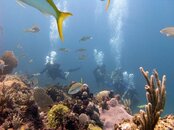Adobo
Contributor
I took a class recently where the instructor showed an amazing amount of awareness. He knew all kinds of detail regarding the dive, what each diver was doing during key situations and vital data (such as time, gas, landmarks) at crucial times. It was like he had eyes on the back of his head and a photographic memory to boot. Part of what I learned in the class is that awareness is a good thing to develop, regardless of the type of diving one does.
As a new(ish) diver, I am working on improving my awareness. Any tips or suggestions on what you have done to elevate your awareness level?
As a new(ish) diver, I am working on improving my awareness. Any tips or suggestions on what you have done to elevate your awareness level?





